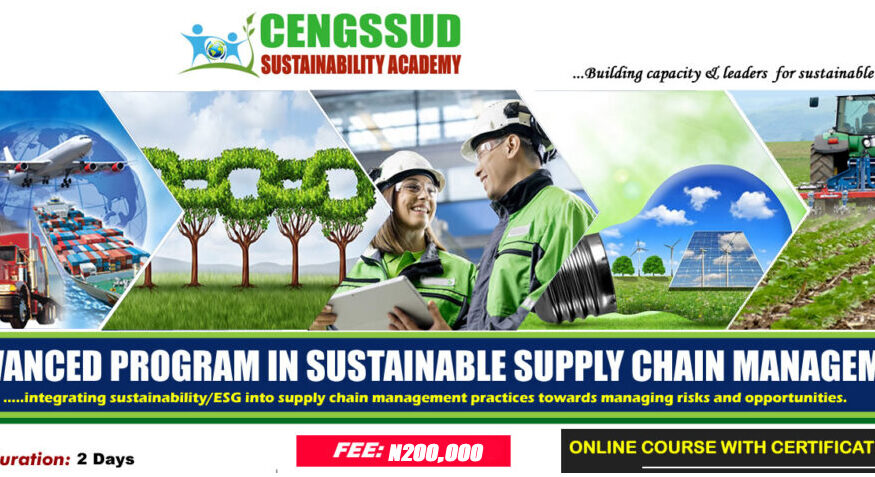COURSE OVERVIEW
More than 50% of consumers are willing to pay at least 10% more for products delivered sustainably, and 76% would wait at least one extra day for climate-friendly delivery of their purchase? Right now, and despite customer demand, many companies still don’t incorporate sustainability into their supply chain operations. This means that they’re missing out on a major source of increased revenue. A study by the World Economic Forum identified revenue increases of up to 20%, cost reductions of up to 16%, as much as a 30% increase in brand value, and about 22% reduction in Greenhouse gas (GHG) emissions among companies engaging in sustainable supply chain initiatives.
The objective of this Masterclass is to train participants on how to integrate the management of environmental, social and economic impacts, and the encouragement of good governance practices, throughout the lifecycles of goods and services.
The course also aims to provide participants with the knowledge on how to create, protect and grow long-term environmental, social and economic value for all stakeholders involved in bringing products and services to market. The inclusion of sustainability as a key part of the course provides a distinguishing feature of this course. You will study a range of taught modules that combine to give a comprehensive understanding of all aspects in sustainable supply chain management, including procurement, circular economy, waste elimination, resource life extension, risk management, supply and the distribution of products, as well as tackling cross-cutting issues such as the impact of technology, etc.
TRAINING OBJECTIVES
- The SSCM trainings convey the drivers and business cases for SSCM and enable the participants to:
- understand what is meant by sustainability in the context of the supply chain
- identify supply chain risks and stakeholder expectations,
- define a strategy as well as supplier development measures that address the relevant issues; and
- establish performance indicators to support the control and communication of progress.
- Sustainability is embedded as a core part of the course, which is distinctive from many supply chain
programmes elsewhere.
- You will have the chance to acquire high-quality practical skills and to develop innovative ideas.
- Each training includes in-depth instructions and extensive exchange with the other participants.
WHO SHOULD ATTEND?
All personnel, All suppliers, Procurement practitioners, Logistics operators, CSR, Operations and all sustainable supply chain enthusiast etc., CEOs, COOs, CIOs, CPOs, Directors/Heads of Operations, Plant Managers / Sales Managers, Heads of IT Infrastructure, Procurement/Purchase Managers, Material Managers, Administrators, and all other personnel interested in building a career in sustainable supply chain management
COURSE CONTENT/MODULES
MODULE 1:
- What is Supply Chain Sustainability and its importance?
- Sustainable Development Impacts and business case in Supply Chains sustainability
- Meeting Business Objectives through Supply Chain Sustainability
- Realizing Efficiencies
- Creating Sustainable Products
- Understanding the External Landscape and Stakeholders Expectations
- Emerging risks and opportunities in supply chains
MODULE 2:
- Establishing a Vision
- Supply Chain Sustainability Vision Statements
- Establishing Sustainability Expectations for the Supply Chain
- Overview of Codes of Conduct
- Adopting or Writing a Code of Conduct for the Supply Chain
- Topics and References to Consider in Writing and Adopting a Supplier Code of Conduct
- Using the Code
MODULE 3:
- Determining the Scope
- The Importance of Looking Beyond Direct Supplier Relationships
- Mapping the Supply Chain
- Segmenting the Supply Chain
- Supply Chain Sustainability Risks Mapping
- Managing Supply Chain Risk and maximising
- Supplier control levels
MODULE4:
- Engaging with Suppliers
- Tools for Engaging with Suppliers on Sustainability
- Selecting Communications Channels
- Monitoring and Evaluations
- Supplier self-assessments
- Supplier Audit
- Supplier Capability Building
MODULE 5: CIRCULAR ECONOMY (The act and science of waste
elimination and resource life extension)
- Understanding and identifying supply chain waste
- Assess supply chain waste generation and Mapping the
Waste-Elimination Process & strategy
- Eliminating Waste at Work: Getting Started
- Resource life Extension
- Reuse, Repair, Remanufacturing and Recycling
- Product Stewardship, Extended Producer Responsibility
MODULE 6:
- Determining Roles & Responsibilities
- Internal Alignment
- Governance and Oversight: Executive Leadership and the Board of Directors
- The Elements of Internal Responsibility for Supply Chain Sustainability
- Integrating Sustainability across Functions
MODULE 7:
- Industry Collaboration & Multi-Stakeholder Partnerships
- The Context for Industry Collaboration
- Opportunities and Risks of Industry Collaboration
- List of Industry Collaborations
- Multi-Stakeholder Partnerships
MODULE 8
- Establishing Goals & Tracking and Communicating Performance
- The Process of Goal Setting
- Goals for Internal Performance
- Goals for Supplier Performance
- Measurement Processes and Practices
- Global Reporting Initiative (GRI)
- How to use data
- Communicating Progress and Reporting Partnerships
- Live Online Training Date
April 17, 2025 - April 18, 2025
10:00 am - 4:00 pm

